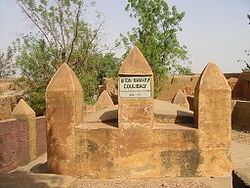
Bitòn Coulibaly
Encyclopedia

Bambara Empire
The Bamana Empire was a large pre-colonial West African state based at Ségou, now in Mali. It was ruled by the Kulubali or Coulibaly dynasty established circa 1640 by Kaladian Coulibaly also known as Fa Sine or Biton-si-u...
in what is now Mali
Mali
Mali , officially the Republic of Mali , is a landlocked country in Western Africa. Mali borders Algeria on the north, Niger on the east, Burkina Faso and the Côte d'Ivoire on the south, Guinea on the south-west, and Senegal and Mauritania on the west. Its size is just over 1,240,000 km² with...
's Ségou Region
Ségou Region
Ségou is the fourth most populous administrative region in Mali, whose capital is the town of Ségou.-Geography:Situated at the center of Mali, Ségou Region covers 64,947 km²...
and Mopti Region
Mopti Region
Mopti is the fifth administrative region of Mali, covering 79,017 km². Its capital is the city of Mopti.-Geography:Mopti Region is bordered by Tombouctou Region to the north, Ségou Region to the southwest, and Burkina Faso to the southeast....
.
Great-grandson of former Ségou
Ségou
Ségou is a city in south-central Mali, lying northeast of Bamako on the River Niger, in the region of Ségou. It was founded by the Bozo people, on a site about from the present town...
king
Monarch
A monarch is the person who heads a monarchy. This is a form of government in which a state or polity is ruled or controlled by an individual who typically inherits the throne by birth and occasionally rules for life or until abdication...
Kaladian Coulibaly
Kaladian Coulibaly
Kaladian Coulibaly was a West African ruler who founded one of the first large Bambara kingdoms, centered on Ségou in what is now Mali. Around 1650, Coulibaly's kingdom was one of the dominant forces in the region. Though it lacked a systematic framework and thus failed to outlast his death...
, Mamary Coulibaly settled in Ségou in his youth and soon became head of the Tòn, a voluntary organization for young men, taking the title of "Bitòn." Under Coulibaly's leadership, the Tòn transformed from an egalitarian society into an army of "Tondions." Prompted by popular up rise against the king of Segou the populace suggested he takes over the leadership of the Bambara kingdom, Coulibaly quickly subdued rival chiefs of Ségou and used the city as a capital for his new Bambara Empire.
Fortifying himself with defensive techniques from the Songhai
Songhai Empire
The Songhai Empire, also known as the Songhay Empire, was a state located in western Africa. From the early 15th to the late 16th century, Songhai was one of the largest Islamic empires in history. This empire bore the same name as its leading ethnic group, the Songhai. Its capital was the city...
tradition, Coulibaly created a thousand-man army and a navy of war canoe
Canoe
A canoe or Canadian canoe is a small narrow boat, typically human-powered, though it may also be powered by sails or small electric or gas motors. Canoes are usually pointed at both bow and stern and are normally open on top, but can be decked over A canoe (North American English) or Canadian...
s to patrol the Niger River
Niger River
The Niger River is the principal river of western Africa, extending about . Its drainage basin is in area. Its source is in the Guinea Highlands in southeastern Guinea...
, staffing both with men already captured in his conquests. Coulibaly then proceeded to launch successful assaults against his neighbors, the Fula
Fula people
Fula people or Fulani or Fulbe are an ethnic group spread over many countries, predominantly in West Africa, but found also in Central Africa and Sudanese North Africa...
ni, the Soninke, and the Mossi; he also attacked Tomboctou, though he held the city only briefly. During this time he also founded the city of Bla as an outpost and armory.
Coulibaly's new empire thrived on trade with the Berber to the north due to the Islamic influence, including that of local slaves
Slavery
Slavery is a system under which people are treated as property to be bought and sold, and are forced to work. Slaves can be held against their will from the time of their capture, purchase or birth, and deprived of the right to leave, to refuse to work, or to demand compensation...
captured in its many wars and resold to African local traders to the south and west (not European Slave trade); the demand for slaves then fueled the empire on to further wars.
Bitòn Coulibaly was succeeded by Dinkoro Coulibaly
Dinkoro Coulibaly
Dinkoro Coulibaly was the ruler of the Bambara Empire from 1755 to 1757. Successor and relative of empire founder Bitòn Coulibaly, Dinkoro soon lost control of the empire in a succession of military coups. Dinkoro was assassinated in 1757, and succeeded by his brother, Ali Coulibaly...
following his death in 1755. However, the Coulibalys failed to keep control of the empire, and it fell into anarchy until Ngolo Diarra
Ngolo Diarra
Ngolo Diarra was the king of the Bambara Empire from 1766 to 1795.Following the 1755 death of empire founder Bitòn Coulibaly, his descendants proved unable to maintain control, the kingdom fell briefly into anarchy. Ngolo Diarra, a freed slave, seized the throne in 1766 and soon restored order...
seized the throne in 1766.

